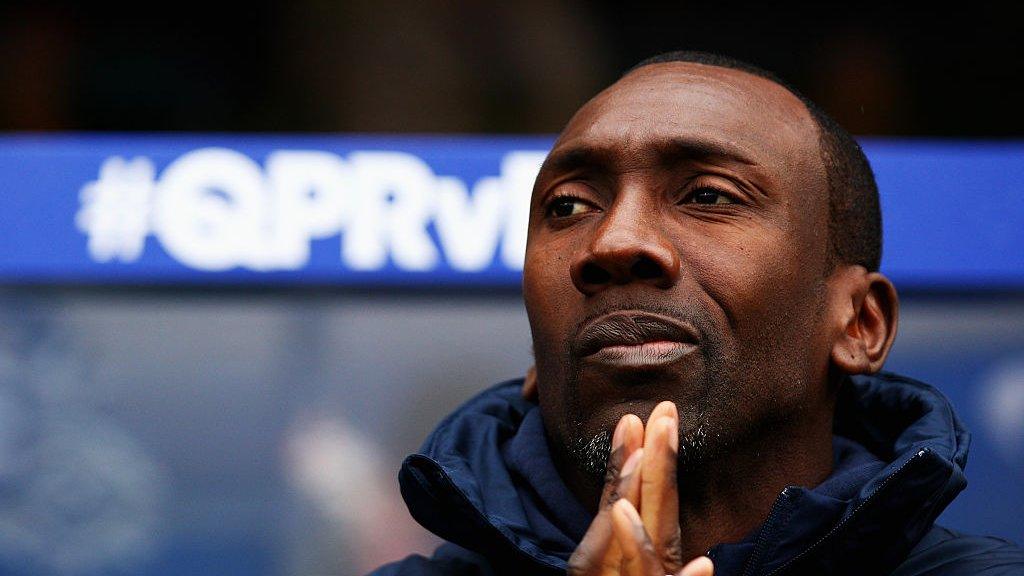Where are the most dangerous places in England to manage?
- Published
- comments
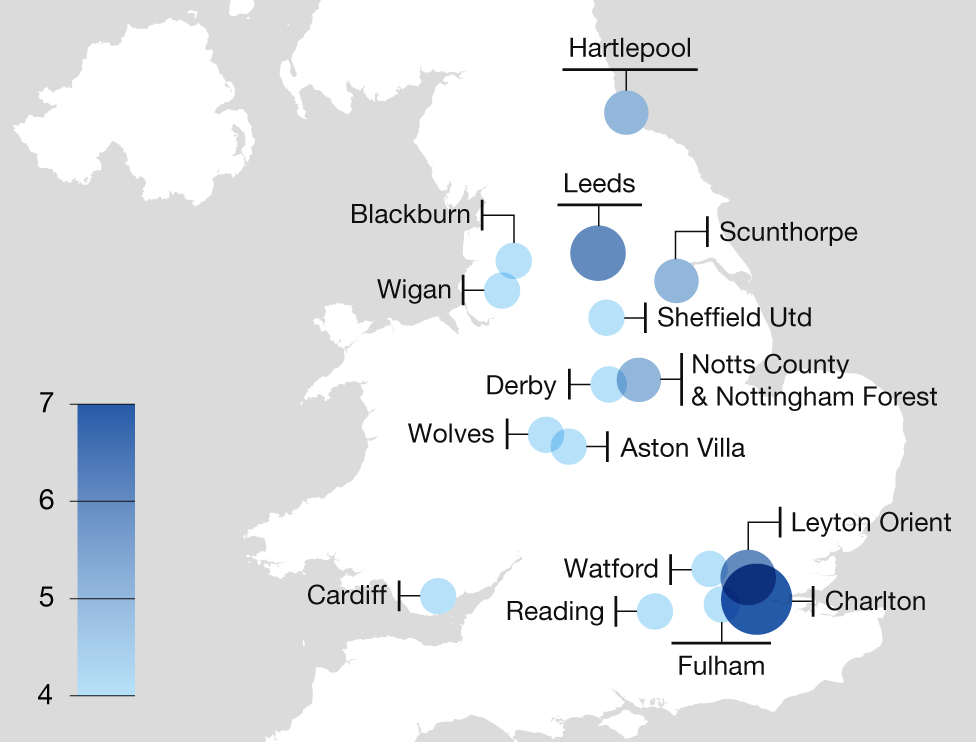
Charlton (7), Leeds and Leyton Orient (both 6) lead the list of clubs that have sacked the most managers, with Nottingham Forest and Notts County both dismissing five
Nottingham. Home to the oldest club in professional football and the city where Brian Clough carved his name into the annals of the beautiful game.
Sadly, it's now a place to avoid if you're a manager looking to make your mark.
Leeds doesn't offer much hope either. Neither does Hartlepool. But which club should you really think twice about managing before signing on the dotted line?
We take a look at the English clubs, cities and towns that offer very little job security...
The sack race
Almost 200 Premier League and Football League managers have been sacked since the start of 2012-13.
Last season, 58 were dismissed, with an average tenure of just 1.29 years.
The League Managers Association says this "hire and fire culture" is damaging football, with LMA chief Richard Bevan describing the situation as "one of the most concerning cultural aspects of English football".
He also said that "this instability is not healthy nor conducive to the long-term success of the clubs" and pointed out it is not just managers who are affected.
More than 400 professional coaches have also been impacted as a direct consequence of this "unprecedented volatility within the industry".
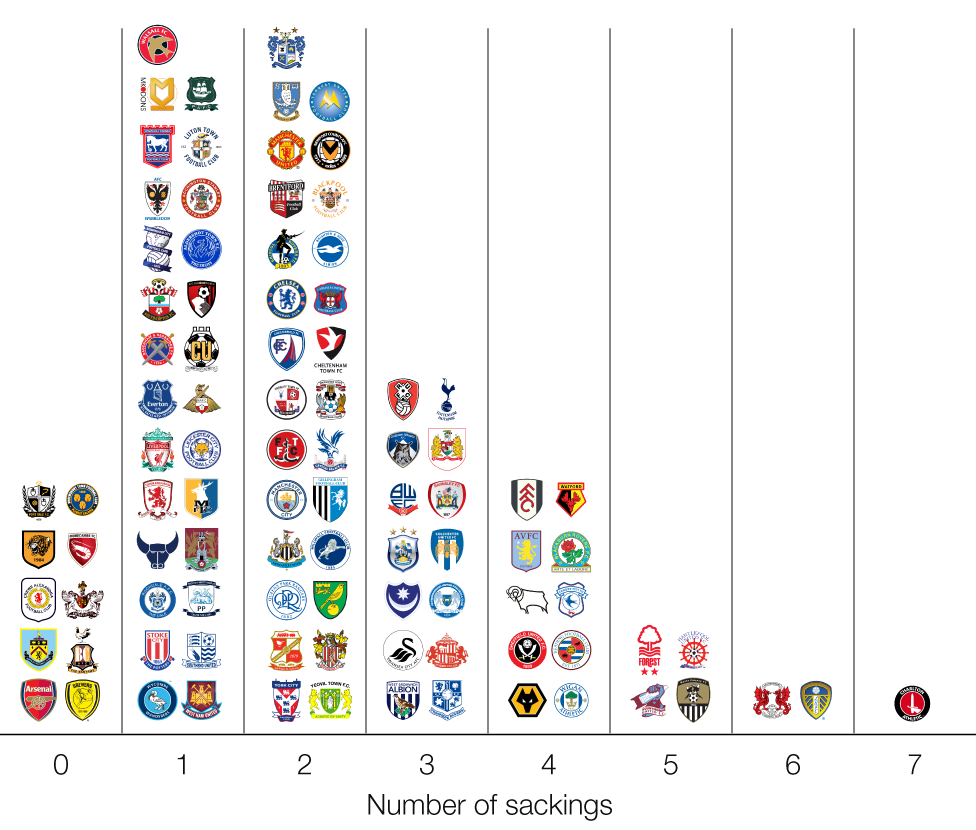
Charlton have sacked the most managers since the start of the 2012-13 season
A new high
Total manager dismissals 2012-13 to 2015-16 | ||||||
|---|---|---|---|---|---|---|
2012-13 | 2013-14 | 2014-15 | 2015-16 | 2016-17 to date | Total | |
Premier League | 8 | 12 | 5 | 12 | 1 | 38 |
Championship | 13 | 10 | 20 | 19 | 7 | 69 |
League One | 11 | 8 | 12 | 14 | 3 | 48 |
League Two | 11 | 7 | 10 | 13 | 2 | 43 |
Total | 43 | 37 | 47 | 58 | 13 | 198 |
Last season's 58 dismissals is the most there has ever been. Only the 53 in 2001-02 (the year the ITV Digital deal collapsed), external comes close to that figure.
For the second season running - and the third time in the last four seasons - the Championship has provided the most dismissals out of the four English professional divisions, illustrating just how much pressure exists on second-tier bosses to reach the lucrative promised land of the Premier League.
As for this season, seven managers have been sacked in the second tier. The victims are Kenny Jackett (Wolves), Roberto di Matteo (Aston Villa), Paul Trollope (Cardiff), Alan Stubbs (Rotherham), Walter Zenga (Wolves), Gary Caldwell (Wigan) and Jimmy Floyd Hasselbaink (QPR).
The average length of their tenure was just 383 days.
Average tenure of dismisses managers 2012-13 to 2015-16 (in years) | ||||
|---|---|---|---|---|
2012-13 | 2013-14 | 2014-15 | 2015-16 | |
Premier League | 2.81 | 1.22 | 1.80 | 1.93 |
Championship | 1.04 | 1.93 | 0.86 | 1.13 |
League One | 1.37 | 1.48 | 1.41 | 0.97 |
League Two | 2.57 | 1.08 | 1.44 | 1.26 |
Overall average* | 1.84 | 1.44 | 1.23 | 1.29 |
*Takes into account that more managers have been dismissed in some leagues than others. | ||||
Not so Happy Valley
When Russell Slade lost his job at Charlton last week, he became the seventh managerial dismissal at the Valley since March 2014.
An experienced manager with close to 800 professional games under his belt, the 56-year-old Englishman lasted just six months and 21 matches in charge.
He may have won three and drawn two of his last six league games, as well as guiding the League One club into round two of the FA Cup, but a 3-0 defeat at Swindon Town proved to be too much for the club's owner, Roland Duchatelet.
Before Slade, Chris Powell, Jose Riga (twice), Bob Peeters and Guy Luzon all had their employment terminated by the Belgian businessman, who took over the club in January 2014. Of the seven, only three lasted for more than 20 games - Peeters (28), Luzon (36) and Slade (21).

Roberto di Matteo, Dougie Freedman, Russell Slade and Francesco Guidolin (clockwise from top left) have all lost their job this year
Take avoiding action
Given the glut of clubs in London, it's may not be surprising to learn that 32 managers have been sacked by clubs there since the start of the 2012-13 season.
Outside of the capital, the most treacherous place for a manager is Nottingham, with Forest and Notts County disposing of 10 managers between them.
Sean O'Driscoll, Alex McLeish, Billy Davies, Stuart Pearce and Dougie Freedman have all come and gone from the City Ground.
At County, Keith Curle, Chris Kiwomya, Shaun Derry, Ricardo Moniz and Jamie Fullarton - who lasted just 69 days - were all shown the door.
Leeds (six) is the third most dangerous, made even more significant for being a one-club city. Garry Monk is now in charge.
Change for change's sake?

Of the seven clubs that have sacked five or more managers since 2012-13, only two of them are currently in a better league position than they were four and a bit seasons ago
Seven clubs have sacked five or more managers since 2012-13. We've heard about Charlton and Leeds, but Leyton Orient - another London side - should also carry a health warning.
Since 2012-13, the League Two club have dropped 23 places on the Football League ladder and have sacked six managers in that time. Italian Alberto Casavin is now in charge but has lost five of his seven games.
After Orient come Hartlepool, Nottingham Forest, Notts County and Scunthorpe. They have each sacked five managers since 2012-13.
The conveyor belt of appointments doesn't seem to have worked for Hartlepool and Notts County. Since 2012-13, 'Pool have dropped 26 places on the league ladder, with County down 26.
It's a different story for Leeds and Scunthorpe. After a rare period of stability under Monk, Leeds are sixth in the Championship - their highest position for 22 months - while Graham Alexander's Scunthorpe lead League One.
Keeping the faith
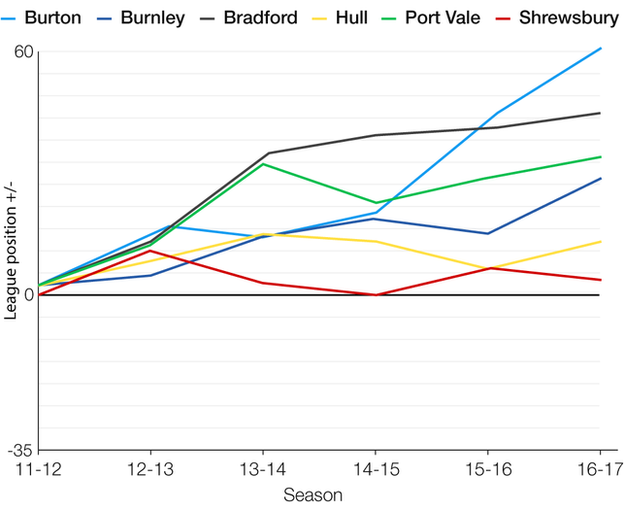
Six clubs have not sacked a manager since the start of 2012-13. All of them are in a better league position now than at the start of the time period
A big thumbs-up to Arsenal, Burton, Burnley, Bradford, Crewe, Exeter, Hull, Morecambe, Port Vale and Shrewsbury. None of these clubs have dismissed a manager since the start of the 2012-13 season.
Arsene Wenger has endured some supporter unrest because of Arsenal's failure to win the Premier League, but the Frenchman has overseen an unprecedented period of consistency, guiding the Gunners to 20 consecutive top-four finishes in the top flight. They also won the FA Cup in 2014 and 2015.
Exeter's Paul Tisdale has also had his position questioned by fans,, external but achieving successive promotions between 2007 and 2009 - followed by a relegation three seasons later - against the backdrop of off-field tragedy and financial worries has earned him the backing of his club.
Crewe have been similarly loyal to Steve Davis, who led the Railwaymen to promotion in his first season in 2011 but saw his side relegated last campaign. They currently occupy a play-off spot in League Two.
Having gained promotion to the Football League as recently as 2007, retaining a place in League Two is an achievement in itself for Morecambe, which is exactly what Jim Bentley has achieved in his five full seasons with the club.
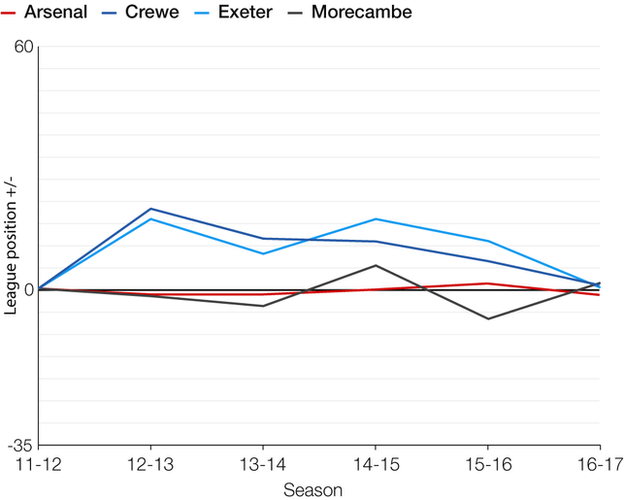
The four clubs that have kept the same manager since the start of 2012-13 are now in a similar league position to what they were at the start of the time period
Being Burton
For the Brewers, managerial stability is key and potentially a factor in their 57-place rise over the last four-and-a-bit seasons.
There have been changes at the top in that time, but that was only when Gary Rowett and Jimmy Floyd Hasselbaink left to join Birmingham City and Queens Park Rangers respectively.
"It's obvious to me that stability is vital," Burton chairman Ben Robinson told BBC Sport. "Ninety-nine per cent of managers will have difficult periods. When that happens, if you believe in your manager you stick by them. Gary Rowett lost 7-1 in one of his games and we stood by him."
Robinson says that staying faithful to a manager is not always popular with fans, but he insists it's the right approach for Burton.
"Our policy is never to interfere," he said. "Win lose or draw, we don't question team selection. We have always let managers get on and manage. We support them and stay patient and strong. We have been very lucky too but there is not a secret formula. It is about trusting the manager you appointed."
'A lovely poison'

Hill has managed more than 500 games
Rochdale boss Keith Hill has been in management almost a decade now. Sacked only once in his career - by Barnsley in December 2012 - the 45-year-old admits it was a bad experience nonetheless.
"You sort the terms out, but it is not nice," he told BBC Sport. "Then you have a couple of weeks to think about it and evaluate after coming out from behind the settee. After the process of mental healing, you evaluate what you have done right, what you have done wrong and look for your next job."
So is the situation getting worse for managers? "Of course," said Hill. "There is a lack of patience in our society and a want for instant success."
Will this hire and fire approach put managers off? "No, definitely not," said Hill. "It is a great environment to be working in.
"You are solving a problem every day. You are creating success and improving young players every day. You are working on behalf of the community and winning. Any ex-football player or manager out of work definitely want to get back in. It is a lovely poison we all take every day."
- Published14 November 2016

- Published5 November 2016
